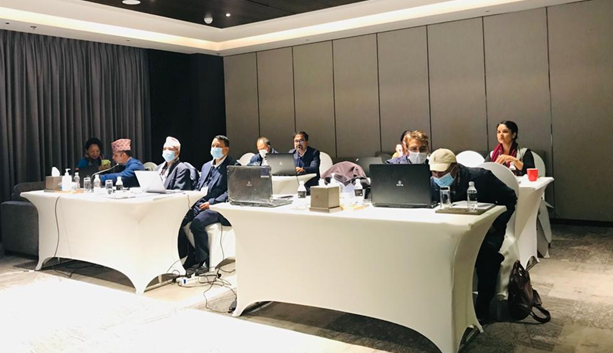The work on the revision of the Codex Standard for Follow-up Formula (CXS 156-1987) has been underway since 2012. It is a long, slow process with many working group discussions, circular letter submissions, conference room documents and differences of opinion and conflicts of interest (the breast-milk substitutes industry attends as part of many observer organisations and even often as delegates on member country delegations). Helen Keller International has been actively engaged in this Codex Committee on Nutrition and Foods for Special Dietary Uses (CCNFSDU) agenda item from the beginning. As a non-governmental organization observer at Codex, Helen Keller International advocates for the protection of breastfeeding and uses its knowledge base to support low and middle-income countries with technical assistance to do the same and have their voices heard in this global forum.
Setting Codex standards is a consensus-driven process, and reaching agreement often involves compromise. At the 42nd meeting (and first ever virtual meeting) of CCNFSDU, some important decisions were made that strengthen the text and importantly allow for some critical decisions to be made at the country-level based on country context.

The name for products for young children 12-36 months was highly contentious and there were two opposing views. While many, including Helen Keller International, felt strongly that these products should not have a name that in any way idealises the products or makes a nutrition or health claim, as they are breast-milk substitutes and no health and nutrition claims are permitted, others felt that the name needed to state that the products contained added nutrients since the standard includes nutrient composition requirements. A compromise was required to move forward and there are now four name options from which countries can select: 1) Drink for young children; 2) Product for young children; 3) Drink for young children with added nutrients; or 4) Product for children with added nutrients. Helen Keller International will advocate at the regional and country level for options 1 and 2 which we believe to be the most accurate description of these products. The Committee also noted that if the name options provided were not deemed satisfactory by a country or region, any other more appropriate designation indicating the true nature of the product could be used. This is potentially a double-edged sword allowing member countries to come up with another name for the product which could either be more positive or more negative.

A major win was that a definition for follow-up formula for young children aged 12-36 months has been finalised and the concerning text that attempted to make these products appear beneficial or necessary was removed. At the last meeting, an important footnote that must always be read in conjunction with the definition, was added whereby it is acknowledged that many countries refer to and regulate these products as breast-milk substitutes. Now, the definition is in alignment with the International Code of Marketing of Breast-milk Substitutes. The definition reads:
“Drink for young children with added nutrients, Product for young children with added nutrients, Drink for young children or Product for young children means a product manufactured for use as a liquid part of the diversified diet of young children1.
1 In some countries these products are regulated as breastmilk substitutes.”
The composition of these products is also vitally important and another success at this meeting was that it was agreed that flavourings will not be permitted in follow-up formula for older infants (6-12 months). There was extensive debate and division on their use in products for young children (12-36 months) and the compromise was that while the text states that certain listed flavourings are permitted, a footnote clearly specifies that “National and/or regional authorities may restrict or prohibit the use of the listed flavourings”. Helen Keller International will advocate at the regional and country level that no flavourings be permitted as these products are breast-milk substitutes.
There will be further discussion at the next meeting related to methods to measure sweetness of carbohydrate sources to further limit the sweetness of these products which is to be encouraged.
Two key issues remain to be discussed – the structure of the standard and the preamble. It is hoped that this important work will be completed at the next meeting, and the standard sent to the Codex Alimentarius Commission for adoption.
This meeting has made it clear that the battle between public health and trade continues. Once the standard is adopted, it will be crucial for member countries to not just adopt this Codex standard but develop their own national regulations and decide how they choose to address the various options that Codex will allow. For example, what name will the product for 12-36 months old children be required to use, will the country define the product as a breast-milk substitute, and will they prohibit flavourings from being used? Advocacy and technical assistance will be required when countries develop and update regulations for these products to ensure that breastmilk and breastfeeding is protected, promoted, and supported in the interest of optimal older infant and young child feeding.
Read the full English report of the 42nd Session of the Codex Committee on Nutrition and Foods for Special Dietary Uses here and the French version here.

